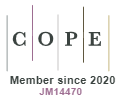Evaluation of pulmonary function and respiratory muscular strength of chemical dependents in treatment
DOI:
https://doi.org/10.5585/conssaude.v17n1.7504Keywords:
Crack Cocaine, Drug users, Spirometry, Physical Therapy Specialty, Health Promotion.Abstract
Introduction: the number of crack use in the Brazilian population has increased annually. Objective: to characterize the profile of the population being treated at the Psychosocial Care Center for Alcohol and Other Drugs (CAPS /AD), for crack use in the city of Maringá and to evaluate the pulmonary function and respiratory muscle strength of these individuals. Method: This is a cross-sectional, quantitative and observational study with 15 crack-dependent individuals under treatment. The presence of respiratory signs and symptoms and previous habits, pulmonary function and respiratory muscle strength were evaluated. Results: Among the results found, 60% of the individuals did not present ventilatory disorders, 13.3% had adequate FVC, 40.0% had adequate FEV1, and the same percentage had adequate IT. 66.7% had adequate PI max and PE max. Conclusion: the results obtained with this study did not present significant alterations for pulmonary function and respiratory muscle strength of the majority of users under treatment in CAPS/AD.Downloads
Download data is not yet available.
Downloads
Published
2018-03-30
How to Cite
1.
Peres PCN, Cian MJ, Grandi TR, Antunes MD, Bertolini SMMG. Evaluation of pulmonary function and respiratory muscular strength of chemical dependents in treatment. Cons. Saúde [Internet]. 2018 Mar. 30 [cited 2024 Dec. 24];17(1):25-31. Available from: https://uninove.emnuvens.com.br/saude/article/view/7504
Issue
Section
Artigos
License
Copyright (c) 2018 ConScientiae Saúde

This work is licensed under a Creative Commons Attribution-NonCommercial-ShareAlike 4.0 International License.






